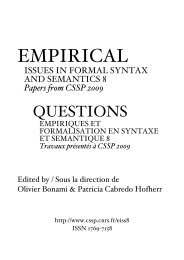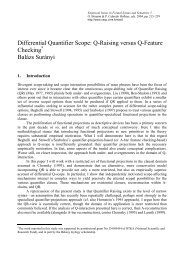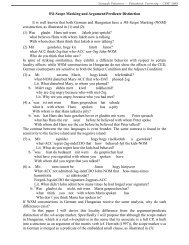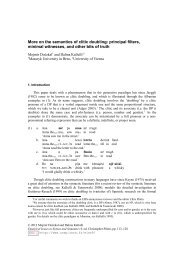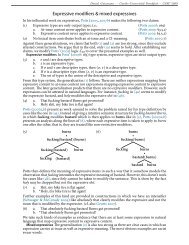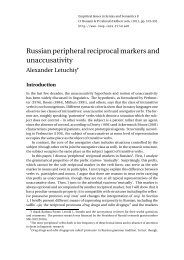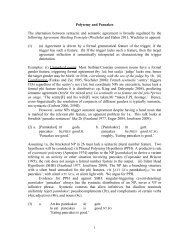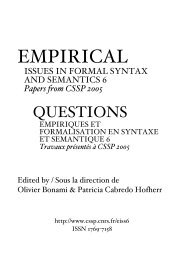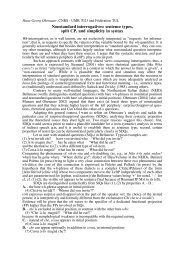Empirical Issues in Syntax and Semantics 9 (EISS 9 ... - CSSP - CNRS
Empirical Issues in Syntax and Semantics 9 (EISS 9 ... - CSSP - CNRS
Empirical Issues in Syntax and Semantics 9 (EISS 9 ... - CSSP - CNRS
You also want an ePaper? Increase the reach of your titles
YUMPU automatically turns print PDFs into web optimized ePapers that Google loves.
Thus, grammaticalization is associated with a desemanticization of the alternation between<br />
the <strong>in</strong>dicative <strong>and</strong> the subjunctive <strong>in</strong> that it freezes the relation between a given lexeme <strong>and</strong> a<br />
given mood <strong>in</strong> the complement. In some cases, it results <strong>in</strong> extend<strong>in</strong>g the use of the subjunctive,<br />
<strong>and</strong> <strong>in</strong> favor<strong>in</strong>g its disappearance <strong>in</strong> other cases, but <strong>in</strong> all cases, it is the mood which appears <strong>in</strong><br />
the positive declarative clauses which is frozen. Hence the change is unidirectional. Thus, this<br />
situation shares two important properties with usual <strong>in</strong>stances of grammaticalization<br />
(desemanticization, unidirectionality). In st<strong>and</strong>ard French, the use of the subjunctive is alive,<br />
but its semantico-pragmatic motivation may be blurred by other factors.<br />
To deal with the generalization of the subjunctive with evaluatives, we have added a<br />
pr<strong>in</strong>ciple of distribution of the moods (30) to the semantico-pragmatic conditions ((20), (27)).<br />
However, this solution is <strong>in</strong>sufficient when one takes <strong>in</strong>to account the smaller lexical contrasts<br />
with mixed predicates <strong>and</strong> the polarity mood. Indeed, we have seen cases where the <strong>in</strong>dicative<br />
occurs although condition (27) is met or not excluded (e.g. with probable), <strong>and</strong> where the<br />
subjunctive occurs although condition (27) is not met (as with ne pas douter). Does that mean<br />
that generalizations concern<strong>in</strong>g the motivation of the moods should be ab<strong>and</strong>oned? We do not<br />
th<strong>in</strong>k so. They are, we ma<strong>in</strong>ta<strong>in</strong>, good generalizations, although they allow for cases where they<br />
do not apply. In other words, they describe preferences rather than clear-cut rules. The<br />
alternation between <strong>in</strong>dicative <strong>and</strong> subjunctive <strong>in</strong> the complement clauses <strong>in</strong> contemporary<br />
French is one phenomenon which shows that the grammatical system must allow for<br />
preferences (see e.g. Bresnan 2007).<br />
References<br />
Becker, Mart<strong>in</strong> G. 2010. Pr<strong>in</strong>ciples of mood change <strong>in</strong> evaluative contexts: the case of French.<br />
Modality <strong>and</strong> mood <strong>in</strong> Romance, ed. by Mart<strong>in</strong> G. Becker <strong>and</strong> Eva-Maria Remberger, 209–234.<br />
Berl<strong>in</strong>: de Gruyter.<br />
Börjeson, L. 1966. La fréquence des subjonctifs dans les subordonnées <strong>in</strong>troduites par que étudiée<br />
dans des textes français contempora<strong>in</strong>s. Studia Neophilologica 38.3–64.<br />
Bosque, Ignacio, <strong>and</strong> Violeta Demonte. 1999. Gramática descriptiva de la lengua española. Madrid:<br />
Espasa Calpe S.A. – Real Academia Española.<br />
Bresnan, Joan. 2007. Is syntactic knowledge probabilistic? Experiments with the English dative<br />
alternation. Roots: L<strong>in</strong>guistics <strong>in</strong> search of its evidential base, ed. by S. Featherston <strong>and</strong><br />
W. Sternefeld, 77–96. Berl<strong>in</strong>: Mouton de Gruyter.<br />
De Mulder, Walter, <strong>and</strong> Danièle Godard. 2010. Le subjonctif. Ms. Gr<strong>and</strong>e grammaire du français, ed.<br />
by Anne Abeillé, Danièle Godard, <strong>and</strong> Annie Delaveau. Arles: Actes Sud, to appear 2014.<br />
Farkas, Donka F. 1992. On the semantics of subjunctive complements. Romance Languages <strong>and</strong><br />
Modern L<strong>in</strong>guistic Theory: Papers from the 20th L<strong>in</strong>guistic Symposium on Romance Languages<br />
(LSRL XX), ed. by Paul Hirschbühler <strong>and</strong> Konrad Koerner, 69–103. Amsterdam/Philadelphia:<br />
John Benjam<strong>in</strong>s.<br />
Farkas, Donka F. 2003. Assertion, belief <strong>and</strong> mood choice. H<strong>and</strong>out, Workshop on Conditional <strong>and</strong><br />
Unconditional Modality, ESSLLI, Vienna, 2003.<br />
Gaatone, David. 2003. La nature plurielle du subjonctif français. La syntaxe raisonnée : Mélanges de<br />
l<strong>in</strong>guistique générale et française offerts à Annie Boone à l’occasion de son 60e anniversaire,ed.<br />
by Pascale Hadermann, Ann van Slijcke, <strong>and</strong> Michel Berré, 57–78. Louva<strong>in</strong>-la-Neuve: DeBoeck<br />
Duculot.<br />
G<strong>in</strong>zburg, Jonathan, <strong>and</strong> Ivan A. Sag. 2000. Interrogative <strong>in</strong>vestigations. Stanford: CSLI Publications.<br />
Giorgi, Aless<strong>and</strong>ra, <strong>and</strong> Fabio Pianesi. 1997. Tense <strong>and</strong> aspect: From semantics to morphosyntax.<br />
Oxford: OUP.<br />
Godard, Danièle, <strong>and</strong> Walter De Mulder. 2011. Indicatif et subjonctif dans les complétives en français.<br />
Cahiers de lexicologie 98.148–160.<br />
Grevisse, Maurice, <strong>and</strong> André Goosse. 2011. Le bon usage. Louva<strong>in</strong>-la-Neuve: DeBoeck-Duculot.<br />
147



